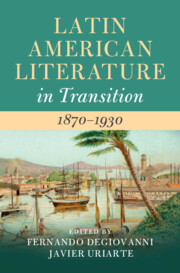Book contents
- Latin American Literature in Transition 1870–1930
- Latin American Literature in Transition
- Latin American Literature in Transition 1870–1930
- Copyright page
- Contents
- Figures
- Contributors
- Acknowledgments
- Introduction
- Part I Commodities
- Part II Networks
- Part III Uprisings
- Part IV Connectors
- Part V Cities
- Index
- References
Introduction
Published online by Cambridge University Press: 14 January 2023
- Latin American Literature in Transition 1870–1930
- Latin American Literature in Transition
- Latin American Literature in Transition 1870–1930
- Copyright page
- Contents
- Figures
- Contributors
- Acknowledgments
- Introduction
- Part I Commodities
- Part II Networks
- Part III Uprisings
- Part IV Connectors
- Part V Cities
- Index
- References
Summary
This volume explores how the circulation of goods, people, and ideas permeated every aspect of the continent’s cultural production at the turn of the century. We are interested not only in understanding how literature and the arts confronted the unprecedented penetration of global capital in Latin America, but also in exploring the ways in which rapidly transforming technological and labor conditions contributed to forging new intellectual networks, creating original discourses, exploring innovative forms of knowledge, and reimagining the material and immaterial worlds. This volume shows the new directions in turn-of-the-century scholarship that developed over the last two decades by investigating how the experience of capitalism produced an array of works that deal with primitive accumulation, transnational crossings, and an emerging technological and material reality in diverse geographies and a variety of cultural forms. The various contributions provide a novel understanding of the period as they discuss the ways in which particular commodities, intellectual networks, popular uprisings, materialities, and nonmetropolitan locations redefined cultural production at a time when the place of Latin America in global affairs was significantly transformed.
- Type
- Chapter
- Information
- Latin American Literature in Transition 1870–1930 , pp. 1 - 12Publisher: Cambridge University PressPrint publication year: 2022



